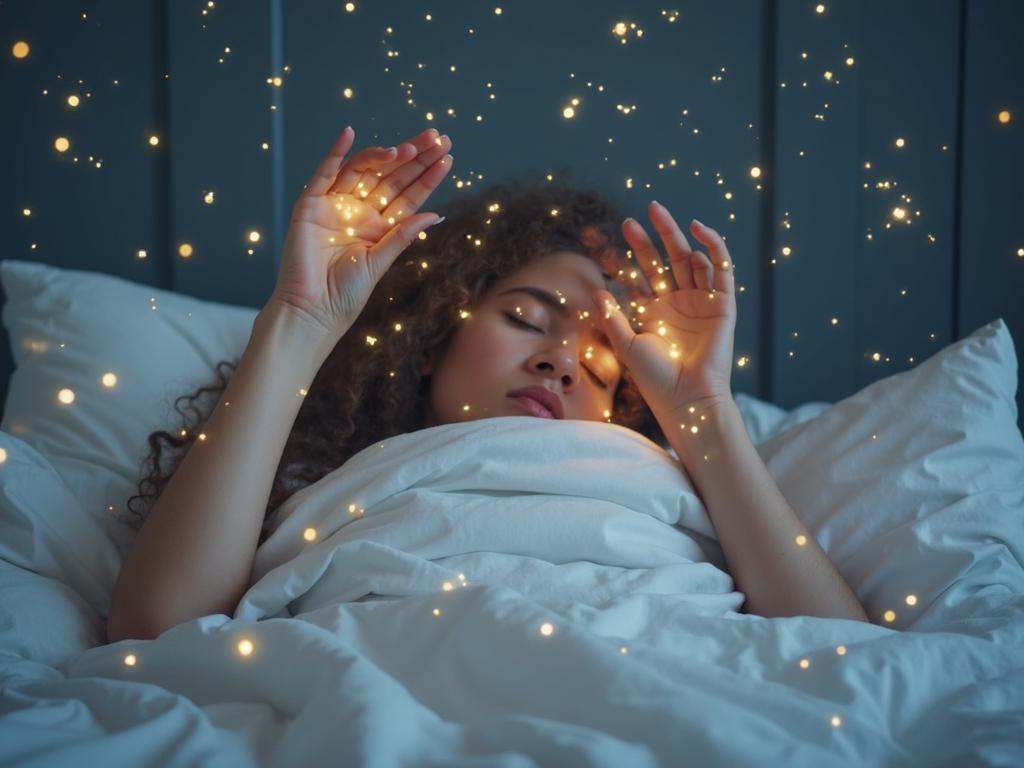Introduction
Are you tossing and turning at night, watching the clock tick away precious hours of potential sleep? You’re not alone. In our fast-paced world, where blue light reigns and stress levels soar, our body’s natural sleep hormone – melatonin – often needs a helping hand.
This comprehensive guide unlocks the mysteries of melatonin, from its natural production in your pineal gland to choosing the right supplement for your sleep needs. Whether you’re a new parent battling sleep deprivation or a senior seeking more restful nights, understanding melatonin could be your key to better sleep.
Understanding Melatonin
What is Melatonin?
Meet melatonin, your body’s go-to night owl hormone crafted by the pineal gland, nestled in your noggin. When the sun calls it a day, melatonin steps up to play, nudging you toward dreamland. It’s like your body’s natural night light, dimming the scenery so you can snooze. Light, age, your daily dealings, even when you hit the hay, all dance with melatonin levels to orchestrate how sleepy (or not) you feel.
| Age Group | Typical Melatonin Level (pg/ml) |
|---|---|
| Little Ones | 50 – 100 |
| Youngsters | 10 – 40 |
| Teens | 20 – 30 |
| Adults | 10 – 20 |
| Golden Agers | 5 – 10 |
Role of Melatonin in Sleep
Melatonin’s like your bedtime DJ, spinning tunes that crank down your body’s energy and turn up the yawn factor. Its levels take a hike as the day winds down, cueing your body temperature to hit the brakes and the yawns to take over. Handy for those who find themselves wide-eyed at bedtime, melatonin helps script a more predictable curtain call each night.

If you’ve ever battled the dreaded ‘blue light blues’ from too much tech before bed, you know it can mess with your sleep jam. That’s ’cause blue light tells melatonin to chill, which can keep you up longer than you planned. To hit the sack right, a little wisdom on gadget downtime can go a long way. Check out our chat on screen time and sleep for some savvy snooze tips.
Pop some melatonin supplements, and you might find a shortcut to sleepy town, especially if your bod could use a hand boosting its natural supply. But hold on a sec — before you start munching on these sleep helpers, a friendly pow-wow with your doc can ensure they’re good for you and won’t cause any bumps in the night!
“Melatonin is not only essential for sleep but also acts as a powerful antioxidant that supports overall brain health.” – Dr. Matthew Walker, Professor of Neuroscience and Psychology at UC Berkeley
Factors Impacting Melatonin Production
Melatonin is a hormone that’s basically your sleep fairy. It helps make sure you’re catching enough Z’s every night. But, like with everything else life throws our way, a bunch of stuff affects how much melatonin your body puts out—it changes with age and can be influenced by other outside forces.
Age-Related Changes
As folks get older, their body’s melatonin production takes a bit of a nosedive, which can lead to the kind of sleep problems your grandma always complains about. Knowing what your melatonin levels are up to as you get older is super important if you’re trying to get better sleep.
| Age Group | Average Melatonin Levels (pg/ml) | Comments |
|---|---|---|
| Newborns | 70 – 80 | Babies are packed with melatonin, helping them settle into sleep routines. Check out newborn sleep patterns for more info. |
| Toddlers | 10 – 50 | Drops a little as they grow, which might lead to toddler sleep regression. |
| School-Aged Children | 10 – 30 | Levels flat out; all about the sunshine and daylight. Peek at preschooler sleep habits for tips. |
| Teenagers | 15 – 25 | Puberty shakes up sleep cycles like crazy. Discover teenage sleep deprivation. |
| Young Adults | 5 – 15 | Tight jeans and coffee aren’t the only culprits. See college student sleep tips for more. |
| Middle-Aged Adults | 3 – 10 | Hormones mess with your snooze game. Consider sleep tips for 30s. |
| Seniors | 1 – 5 | Big dip in levels; check out senior sleep apnea for answers. |
How Outside Stuff Impacts Melatonin Levels
Okay, besides age, a bunch of random things can get in the way of melatonin doing its thing. Being aware of these influences can really boost your odds of getting some top-notch sleep.
Light Exposure:
Bright lights, especially from your phone or tablet, can stop melatonin in its tracks. Less screen time or using that night mode can work wonders. Read our take on screen time and sleep for the lowdown.
Lifestyle Choices:
Spontaneous sleep schedules mess with how your body dishes out melatonin. Having a set bedtime creates stability for melatonin, allowing it to assist your sleep better.
Diet:
Eating stuff loaded with carbs and tryptophan messes with how melatonin gets made. Having a balanced diet not only helps your waistline but also your slumber. Ponder how to improve sleep naturally.
Environmental Factors:
Loud noises or a lumpy mattress messes with melatonin output. An inviting bedroom sets the stage for supreme sleep.
Health Conditions:
Stuff like anxiety, depression, or chronic pain can throw a wrench in melatonin’s plans, leading to sleep woes. Keeping on top of your mental and physical wellness plays a key role in snooze time.
By cluing in on what gets in the way of melatonin doing its job, people of all ages can take action to boost their shut-eye game. And if all else fails, hunting down the best melatonin supplements might just be your night’s saving grace.
Benefits of Melatonin Supplements
Melatonin supplements can be a real game-changer for anyone trying to sleep better. Whether it’s sorting out sleep patterns or battling jet lag, melatonin does wonders for sleep quality at every stage of life. Here’s a deep dive into what makes melatonin supplements so awesome.
“Studies show that melatonin can reduce the time it takes to fall asleep by an average of 7 minutes while improving overall sleep quality.” – Dr. Michael J. Breus, Clinical Psychologist and Sleep Specialist
Regulation of Sleep Patterns
Melatonin is like your body’s natural lullaby, letting you know it’s bedtime. If you’re struggling with a wonky sleep schedule, melatonin can help set things back to normal.
| Age Group | Melatonin Dosage | Special Notes |
|---|---|---|
| Young Children | 0.5 – 1 mg | Chat with a doc before starting. |
| Teenagers | 1 – 3 mg | Handy for combatting late-night Netflix binges. |
| Adults | 1 – 5 mg | Great for keeping your sleep regular. |
| Seniors | 1 – 3 mg | Helps adjust to changing sleep habits. |
Managing Jet Lag
Jet lag can be a tough cookie when jumping time zones. Melatonin is your friendly travel buddy to help your body clock adjust, so you can enjoy the local scene faster.
| Travel Direction | When to Take It | What to Expect |
|---|---|---|
| Eastbound | 1-2 hours pre-sleep | Helps sync up with early sunrises. |
| Westbound | 1-2 hours pre-sleep | Aids in keeping those eyelids open later. |
Potential Health Benefits
Beyond nailing that perfect sleep, melatonin might score you a few bonus perks. There’s chatter about it easing anxiety, supporting your defenses against germs, and even helping your brain stay sharp.
- Antioxidant Power: Think of melatonin as a bodyguard against pesky oxidative stress.
- Immune Boost: Studies hint it gives your immune system a leg up.
- Brain Boosts: Research links it to memory and brain function, a solid plus for the golden years. For more insights, hit up our section on sleep and brain health.
Before popping melatonin, especially if juggling other meds or health stuff, it’s smart to get your doctor’s two cents. If caring for your elders, our piece on senior sleep apnea might be just the ticket.
Grasping these melatonin perks makes tackling sleep hiccups a breeze, ensuring everyone gets the shut-eye they deserve across all ages.
Choosing the Right Melatonin Supplement
Finding a melatonin supplement that’s just right can really help with catching those zzzs at any age. Let’s break down the options out there and dive into when and how much to use for the best snooze.
Forms of Melatonin Supplements
Melatonin supplements come in various forms to suit different tastes and needs. Here are the usual suspects:
| Form of Melatonin | Description |
|---|---|
| Gummies | Tasty and easy to chew, they’re often a hit, especially with younger folks. |
| Tablets | The classic pill, gets the job done; also comes in forms that act quick or slow it down a bit. |
| Capsules | Close to tablets but might go down smoother for some. Also, available in time-release. |
| Liquid | For when you need to be precise, it’s handy for kids or anyone not keen on swallowing pills. |
| Sublingual | Melts under your tongue for speedy absorption. Great for when you want fast action. |
Each has its perks, so it’s about finding what’s comfy for each person.
Dosage and Timing Recommendations
Getting the right amount and timing is key for melatonin to actually work. Here’s a quick guide:
| Age Group | Recommended Dosage | Timing |
|---|---|---|
| Kids (Ages 3-12) | 0.5 – 3 mg | Half an hour before sleep time |
| Teens | 1 – 5 mg | 30-60 minutes before lights out |
| Adults | 1 – 10 mg | 30-60 minutes before bed |
| Seniors | 0.5 – 5 mg | 30-60 minutes pre-snooze |
If you have little ones with sleep woes, check with a pediatrician before giving them melatonin. Peek at articles on baby sleep patterns or toddler sleep regressions for more tips.
Teenagers and college kids dealing with sleep issues can look for help through resources like sleep tips for college students. Remember, understanding your unique sleep habits matters. Starting with the lowest dose that does the trick is wise. Watch out for how your body reacts, and tweak as needed to gain melatonin’s perks without the pesky side effects. For those curious about natural sleep fixes, check natural sleep boosters for a deeper look.
Safety and Side Effects
Melatonin is quite the buzzword in sleep aid these days, but before diving into the supplement pool, it’s crucial to know what you’re getting into. Just like anything else, it comes with its own set of side effects and potential team-ups (or clashes) with other meds. Knowing what to expect makes all the difference in catching those Zs safely.
Common Side Effects
Now, melatonin isn’t exactly a troublemaker, but when you invite it to your sleep party, sometimes it brings along a few uninvited guests. Here’s a quick rundown of possible side effects:
| Side Effect | How Often? |
|---|---|
| Feeling Sleepy | Pretty common |
| Getting Dizzy | Happens sometimes |
| Headaches | Happens sometimes |
| Feeling Queasy | Pops up now and then |
| Acting Grumpy | Hardly shows up |
Most times, these side effects are like pop-up ads—annoying but harmless—and they disappear on their own. Kicking things off with a small dose can help you see how your body vibes with it. Before making any big moves, especially if you’re pregnant or just had a baby, a quick chat with the doctor would be a smart idea.
Interactions with Medications
Here’s where you gotta put on your detective hat. Melatonin doesn’t always play nicely with other meds, sometimes causing those weird side effects nobody asked for. Check out some potential interactions:
| Medication Type | Possible Mischief |
|---|---|
| Blood thinners | Risk of a bleed-a-palooza |
| Immunosuppressants | Not as effective |
| Sleepy pills | Can amp up the snooze factor |
| Mood lifters | Can mess with mood and drowsiness |
If you’re juggling any of these meds, having a heart-to-heart with your doctor about adding melatonin could be beneficial. This is especially a thing for parents worrying about their youngsters or for our start hoodie octogenarians.
For adults wrangling with sleep dramas, there’s some good stuff on teenage sleep deprivation and senior sleep apnea on our site. And for those on the hunt for natural sleep enhancers, take a peek at our piece on how to catch better Zs without meds.

Tips for Better Sleep Hygiene
Nailing down a solid sleep routine and setting up your bedroom to be the most inviting nest in town are crucial for anyone who’s tired (literally) of tossing and turning all night. Whether you’ve got a crying baby, a teenager who stays up too late, or are just trying to fend off insomnia as you age, these tips can help anyone catch better Z’s.
Establishing a Sleep Routine
Your body loves a good schedule and keeping consistent sleep habits is like giving it a daily high-five. Try these ideas to get into a rhythm:
| Tips for Sleep Routine | Description |
|---|---|
| Stick to the same sleep times | Try going to bed and waking up at the same hour every day—even on weekends. |
| Wind down activities | Do something relaxing before bed, like reading a book or soaking in a warm bath. |
| Short naps | If you need a nap, keep it quick (20-30 minutes max) and steer clear of snoozing late in the day. |
| Turn off tech | Shut down those screens at least 30 minutes before hitting the sack. For more, check out how screen time messes with sleep. |
It’s tough for new parents to sync up with their baby’s sleep habits. Check out our pieces on newborn sleep patterns and toddler sleep regression for tips.
Creating a Sleep-Friendly Environment
Making your sleep space as cozy as your imagination spins it is a game-changer for getting a good night’s rest. Think about these things:
| Sleep Environment Factors | Importance |
|---|---|
| Cool room | Keep your room a refreshing 60-67°F to sleep more soundly. |
| Noise management | Earplugs or white noise machines can help block out pesky sounds. Look into our picks for the best white noise machines for babies. |
| Keep it dark | Use blackout curtains or an eye mask to keep light away. |
| Comfy bedding | Invest in good pillows and a quality mattress for dreamier sleep. Peek at the best mattresses for seniors and best pregnancy pillows. |
If teenagers or young adults are fighting off wonky sleep patterns, they might find help in our articles on teen sleep deprivation and college sleep tips.
Putting together a routine that helps you hit the hay and setting up a bedroom that lulls you to sleep could be the secret to better nights and days, no matter where life finds you. We have more advice for those nitty-gritty sleep issues like pregnancy sleep challenges, post-baby slumber solutions, tips for folks in their 30s, dealing with perimenopause sleep struggles, sleep insights for men, battling senior sleep apnea, and how to naturally boost your sleep game.
Melatonin for Every Age and Stage
Everyone’s got their own set of sleep issues, from cranky toddlers to tech-obsessed teens, and don’t even get me started on juggling life stress in your 40s. Here’s a quick look at how melatonin might just be the pixie dust you need at different points in life, with a nod to parents, the young and restless, stressed midlifers, golden-agers and their always-tired caregivers.
Tired Parents Club
Got little ones who think sleep is for the weak? You’re not alone. Between newborns who think 3 AM is party-time and toddlers in the midst of sleep regression, it’s a hot mess. Melatonin could help you hit the snooze button more often by syncing your schedule with your kid’s wild sleep phases.
Best Bets on Dosage for Kids
| Kiddo’s Age | Dosage That Might Work |
|---|---|
| Tiny Humans (1-3 yrs) | 0.5 – 1 mg |
| Preschool Terrors (4-5 yrs) | 1 – 3 mg |
| Mini Grown-Ups (6-12 yrs) | 1 – 3 mg |
Teenagers and Screenagers
Teens and young adults, better known as night owls thanks to screens and moonlit adventures, have their own sleep struggles. Melatonin can lend a helping hand in getting them to embrace the beauty of nighttime Zs—especially if they put down screens and hit the sack earlier.
Quick Dosage Guide for Night Owls
| Age | Dosage | Best Time |
|---|---|---|
| Teens (13-19 yrs) | 1 – 5 mg | 30-60 mins before crashing |
| Young Whippersnappers (20-30 yrs) | 1 – 3 mg | 30-60 mins before bedtime |
Got a college kid? Point them to college-friendly sleep hacks.
Stressed and Sleepless Middle-Aged Folks
Stuck in the middle of stress-town with life throwing curveballs? Say hello to insomnia. Melatonin might just be your life raft, helping calm nerves and steady sleep schedules.
Dosage Divulged for the Over-30s
| Age-ish | Dosage Range |
|---|---|
| Seasoned Ladies and Gents (30-50 yrs) | 2 – 5 mg |
Check out the lowdown on sleep for the over-30 crowd for more.
Wise Seniors and Their Sidekicks
Sleep can go haywire as we age—thank you very much, sleep apnea and other issues. Melatonin might step up to the plate, improving those precious nightly hours of shut-eye.
Dose Details for Our Elders
| Stalwart Age | Dosage Idea |
|---|---|
| Seniors (60+) | 1 – 3 mg |
It’s on caregivers to notice changes and ensure things stay on the safe side when mixing with other meds.
Tips for Healthcare Wizards
Doctors and nurses know the drill—patient safety and easing sleep woes go hand in hand with melatonin advice. Things like screen time impact, lifestyle game-changers, and giving good advice on sleep during pregnancy or postpartum matter big time.
Careful and clever use of melatonin for every age makes sleep less of a mystery and more a reality. Personalizing advice based on each life stage helps iron out those sleep troubles, moving everyone one step closer to the dreamland they richly deserve.
Conclusion
Melatonin stands as nature’s sleep conductor, orchestrating our body’s intricate dance between wakefulness and rest. From helping jetlagged travelers adjust to new time zones to supporting seniors in maintaining healthy sleep patterns, this versatile hormone plays a crucial role in our daily lives. While melatonin supplements can be valuable allies in the quest for better sleep, remember that they work best as part of a comprehensive sleep strategy that includes good sleep hygiene and consistent bedtime routines. By understanding your body’s unique needs and working with healthcare providers, you can harness melatonin’s benefits to unlock more refreshing, restorative sleep – no matter your age or stage of life.
FAQs
Q: How long does it take for melatonin supplements to work?
Typically, melatonin takes 30-60 minutes to start working. It’s best taken 1-2 hours before bedtime.
Can I take melatonin every night?
While melatonin is generally safe for short-term use, consult your healthcare provider about long-term use, as it may affect your body’s natural production.
What’s the right melatonin dosage for adults?
Most adults start with 0.5-5mg, but it’s best to begin with the lowest effective dose and adjust as needed under medical supervision.
Does melatonin interact with other medications?
Yes, melatonin can interact with various medications, including blood thinners, diabetes medications, and immunosuppressants. Always consult your healthcare provider.
Is melatonin safe for children?
While melatonin can be safe for children under medical supervision, parents should first try behavioral sleep strategies and consult a pediatrician.
Can melatonin help with jet lag?
Yes, melatonin can help adjust your body clock when traveling across time zones. Take it at your target bedtime in the new time zone.
References
National Sleep Foundation: Sleep and Melatonin Research
Mayo Clinic: Melatonin Sleep Guide
Sleep Research Society: Latest Studies on Melatonin
Harvard Health: Understanding Sleep Cycles
Johns Hopkins Medicine: Natural Sleep Aids








